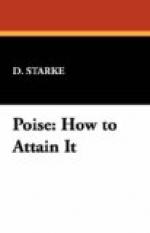The man of poise, on the other hand, feels himself the more impelled to redouble his efforts in proportion to the need his cause has for being well defended.
He knows how to arrange his arguments, and to foresee those of his adversary, and, if he finds himself face to face with a statement which he can not refute, he will seek some means of softening the defeat or of changing the ground of the debate in such a way as to avoid confusion to himself.
In any event, such an occurrence will have no profound effect upon him. Vanquished on one point, he will find the presence of mind to at once change the character of the discussion to questions which are at once familiar and favorable to him.
He who goes forth into life armed with poise has also the marked advantage over the timid that comes from superior health.
This phrase should not be the occasion for a smile. Timidity is a chronic cause of poor health in those who suffer from it.
Pushed to extremes, it is the source of a thousand nervous defects.
We have already touched upon stammering.
Unreasonable blushing is another misfortune of the timid. In drawing the attention of one’s opponents it betrays at once one’s ideas and one’s fears.
Fear of this uncomfortable blushing inhibits many people from making the most of themselves or from properly protecting their own interests.
The shame they feel on account of this inferiority leads them, as we have seen, to seek isolation in which hypochondria slowly grows upon them, sure forerunner of that terrible neurasthenia of which the effects are so diverse and so disconcerting.
The man who was at the outset no more than timid, easily becomes transformed first into a misanthrope, then into a monomaniac tortured by a thousand physical inhibitions, such as the inability to hold a pen, to walk unaccompanied across an open space, to ride in a public conveyance, etc., etc.
It must not be forgotten that these crises of embarrassments always produce extreme emotion accompanied by palpitations whose frequent recurrence may lead to actual heart trouble.
All these disadvantages increase the sullenness of the timid, who are overcome by the sense of their own physical weakness, which they know has its origin in a condition of mind that they lack the power either to change or to abolish.
All these causes of physical inferiority are unknown to the man who appreciates the value of poise and puts it into practise.
Such a man has no fear of embarrassment in speaking. He is a stranger to the misery of aimless blushing. If he does not always emerge victorious from the oratorical combats in which he engages he at least has the satisfaction of acknowledging to himself that he has not been beaten easily or without a struggle. In short, misanthropy, neurasthenia, and all their attendant ills, are for him unknown ailments.




